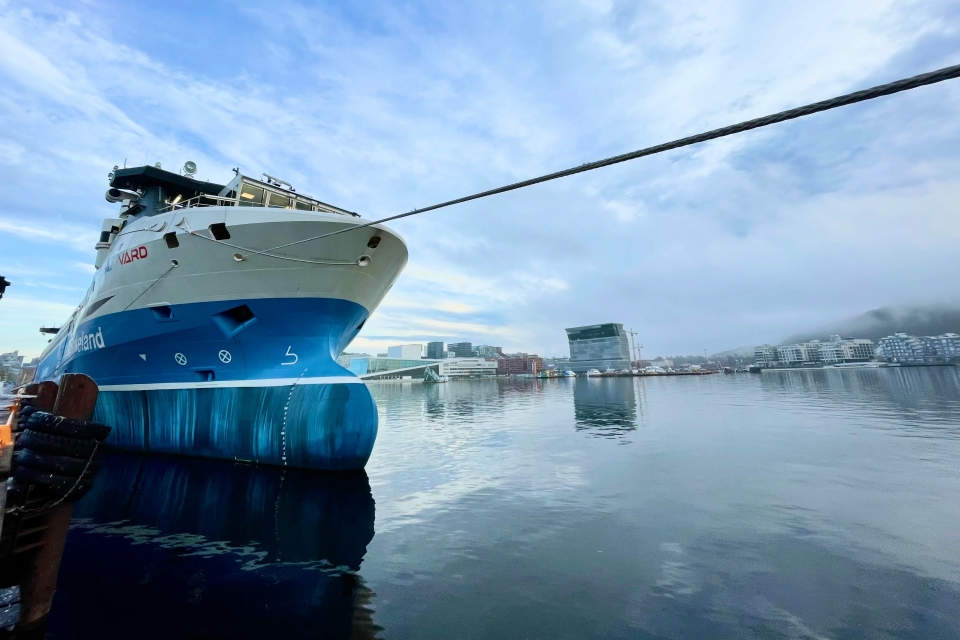The world’s first electric and autonomous container ship – Yara Birkeland – departed for its maiden voyage in the Oslo fjord last week. Yet, fully autonomous operation is still some way off. Getting the technology ready for self-propelled operation is expected to take a two-year testing period.
The Yara Birkeland, which has already received wide coverage in Norwegian and international media, has been developed in collaboration with the Kongsberg Group. The ship was built by VARD with financial support from Enova, and will be in commercial operation from 2022.
‘We have been looking forward to this day for a long time. The Yara Birkeland will transport mineral fertilizer between Porsgrunn and Brevik and will contribute to significant emission cuts during transport,’ says Svein Tore Holsether, CEO of Yara. ‘This an excellent example of green transition in practice, and we hope this ship will be the start of a new type of emission-free container ships. There are a lot of places in the world with congested roads that will benefit from a high-tech solution like this.’
The ship was originally planned to start operating autonomously upon delivery and suffered more delays as a result of the Covid-19 pandemic. The Yara Birkeland was delivered back in December. However, the needed logistics still posed a challenge at that time and more testing was required to allow it to sail autonomously. Yara expects this to take about two years. Then the ship will be certified as an autonomous, all-electric container ship.
Also read: Yara Birkeland delivered but not ready to sail autonomously
Norwegian collaboration
Yara Birkeland is a collaborative project between several partners, where Kongsberg is responsible for the development and delivery of all newly developed technology on the ship. The ship will be operated from Maasterlys’ monitoring and operation’s centre in Horten. Massterly is a joint venture between Kongsberg and Wilhelmsen.
‘Norway is a major maritime nation, and other countries look to Norway for green solutions at sea. Yara Birkeland is the result of the extensive knowledge and experience we have available in the Norwegian maritime cluster and industry. The project demonstrates how we have developed world-leading innovation that contributes to the green transition and provides great export opportunities for Norwegian technology and industry,’ adds Geir Håøy, CEO of the Kongsberg Group.
Also read: Covid-19 puts development of first autonomous container ship on hold
Enova, a government enterprise responsible for promotion of renewable energy, has allocated up to NOK 133.5 million (about EUR 13.3 million) to build the world’s first electric and autonomous container ship. The organisation sees the Yara Birkeland as a project to pave the way for others.
Clean ammonia
In parallel with the construction of Yara Birkeland, Yara has initiated the development of green ammonia as an emission-free fuel for shipping, through the newly started Yara Clean Ammonia.
‘Renewable energy was our starting point in 1905. Now, ammonia can bring us back to our roots. Our large shipping network and existing infrastructure means that ammonia has the potential to become the leading fuel for long-distance shipping globally,’ states Magnus Krogh Ankarstrand, CEO of Yara Clean Ammonia.
As the world’s largest producer of fertilizers, Yara relies on ammonia for manufacture, and to help feed an ever-growing population. At the same time, current ammonia production represents 2 per cent of the world’s fossil energy consumption. This corresponds to about 1.2 per cent of the world’s total greenhouse gas emissions.
‘As the world’s largest producer of ammonia, Yara has launched an aggressive plan of international scale, both to remove current emissions and to establish the production of new, clean ammonia,’ explains Ankarstrand.
Also read: Norwegian grocery distributor plans to use autonomous RoRo vessels








